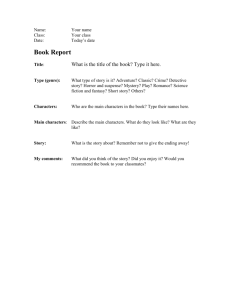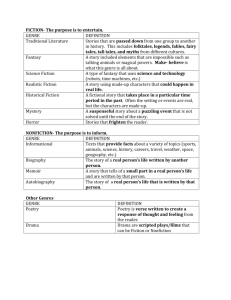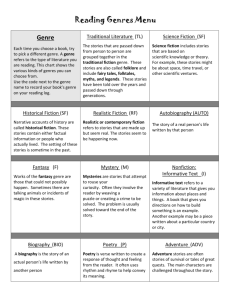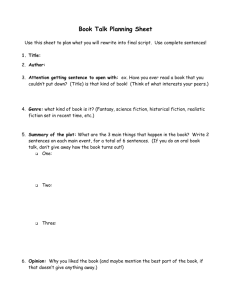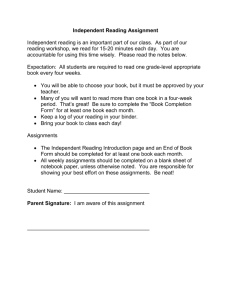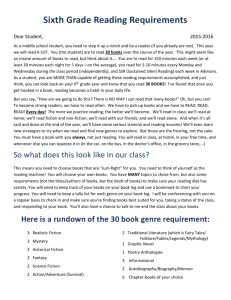Here - York St John University
advertisement
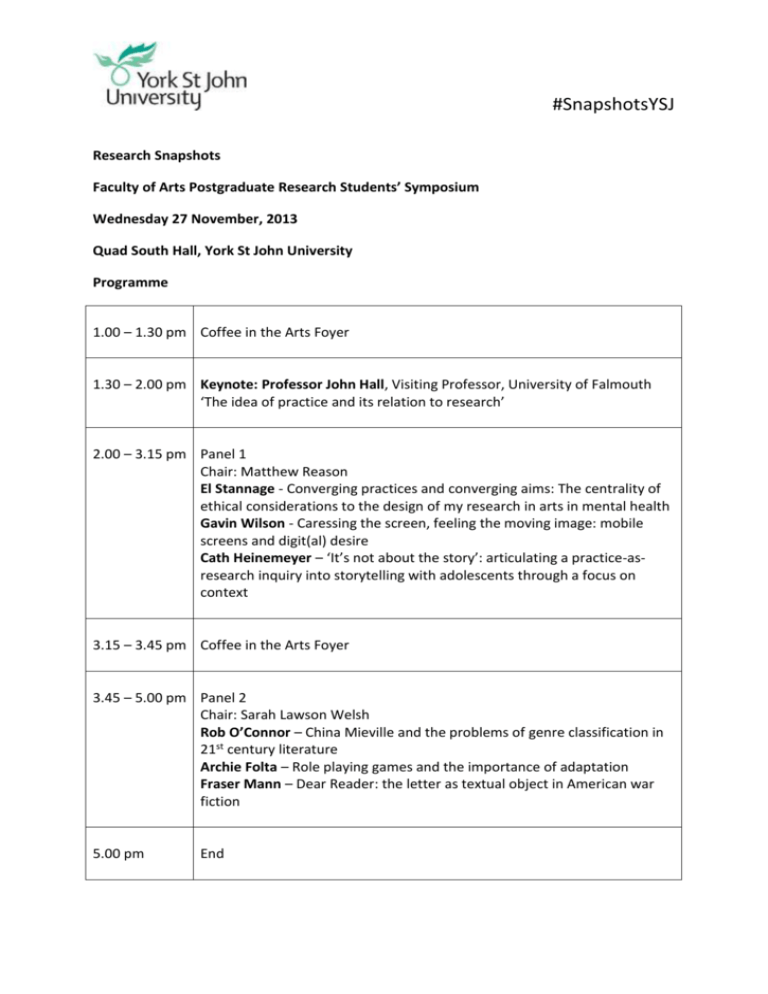
#SnapshotsYSJ Research Snapshots Faculty of Arts Postgraduate Research Students’ Symposium Wednesday 27 November, 2013 Quad South Hall, York St John University Programme 1.00 – 1.30 pm Coffee in the Arts Foyer 1.30 – 2.00 pm Keynote: Professor John Hall, Visiting Professor, University of Falmouth ‘The idea of practice and its relation to research’ 2.00 – 3.15 pm Panel 1 Chair: Matthew Reason El Stannage - Converging practices and converging aims: The centrality of ethical considerations to the design of my research in arts in mental health Gavin Wilson - Caressing the screen, feeling the moving image: mobile screens and digit(al) desire Cath Heinemeyer – ‘It’s not about the story’: articulating a practice-asresearch inquiry into storytelling with adolescents through a focus on context 3.15 – 3.45 pm Coffee in the Arts Foyer 3.45 – 5.00 pm Panel 2 Chair: Sarah Lawson Welsh Rob O’Connor – China Mieville and the problems of genre classification in 21st century literature Archie Folta – Role playing games and the importance of adaptation Fraser Mann – Dear Reader: the letter as textual object in American war fiction 5.00 pm End #SnapshotsYSJ Keynote Speaker Professor John Hall – Falmouth University I had a long career at Dartington College of Arts before its merger with Falmouth. In 2011 I became the first Professor of Performance Writing and now work mostly with research: running the Research Student Development Programme for first-year PhD students, supervising a number of PhD candidates, participating more generally in the research life of the institution, more specifically in the cross-disciplinary research relating to Performance and more specifically still in the Performance Writing Research Group. I have been publishing as a poet since 1966, consistently producing essays on contemporary poetics and poems since the early 1990s, contributing to the growing body of work on Performance Writing since 1994, and making visual texts for frames and cards since about the same date. A second selection of poems for pages – called Keepsache – is to appear in 2013 and will act as a companion to 1999’s Else Here. October 2013 will also see the publication of Essays on Performance Writing, Poetics and Poetry, a two-volume collection of essays. I have also had a number of gallery showings in solo and group exhibitions. In addition to my Falmouth role I am a visiting professor at York St John University, an adviser on research in Performance Writing to Worcester University, an associate editor of Theatre, Dance and Performance Training, a member of the editorial boards of Performance Research and the Journal of British and Irish Innovative Poetry and a trustee for Actiontrack, a participatory arts company based in Somerset. Presenters El Stannage Biography Since graduating with a first class (hons) degree in Theatre at York St John in 2006, Elanor has worked as a freelance theatre practitioner, delivering projects and workshops in diverse communities. Her work is primarily with people at risk of social exclusion and she has extensive experience of working in the contexts of mental health and learning disabilities as theatre facilitator, performer, director and arts administrator. Her research interests focus upon the relationship between arts, healing and mental ill health. Her experiences as a practitioner have proved invaluable in the early stages of the PhD journey. #SnapshotsYSJ Abstract The research design for my first study has developed in response to a gap in the current research within the emerging field of arts in mental health: so far studies have been focussed upon outcomes relating to social inclusion, mental health and well-being. This research design addresses the question: what processes exist within the participation in the arts to reach these outcomes? To answer this question I propose a primary research stage to develop an ethnography of participation in arts and mental health through participant observation. It is here that an ethical stance becomes fundamental as I develop methods of undertaking this which mirror the principals at the heart of the practice itself. Key words: ethics, arts, mental health Gavin Wilson Biography In his early career Gavin worked as a UK-based freelance cameraman and occasional director on film and television dramas, commercials, music videos, and writing narrative fiction screenplays. Interspersed with working within various professional grades in the industry, he has taught media studies, photography and visual communications studies at a number of UK education institutions. Latterly, whilst studying for an MA in Screen Media Cultures, he worked as a Sector Manager for Screen Yorkshire, the screen agency for Yorkshire and the Humber region. The provisional title of his doctoral thesis is 'Cell/ular Cinema: Individuated Production, Public Sharing and Mobile Phone Film Exhibition’. Abstract Caressing the Screen, Feeling the Moving Image: Mobile Screens and Digit(al) Desire Emergent practices in filmmaking, using mobile phones, Smart-Pads and similar devices affects new kinds of connections between filmmaker, subject, moving image and spectator. The introduction of usable on-camera monitors allows (encourages) filmmakers to shun the traditional camera viewfinder, and engage physically with the screen of the moving image. Via touch-screens, framing and composition are squeezed, focussed and zoomed using fingertips. By augmenting visuality with the tactile manipulation of screen surface, the filmmaker’s relationship with the subject and its image can no longer be thought of as determined by eye and brain alone. Building on the phenomenology of tactility and embodiment in film(making) in the work of Jennifer M. Barker (2009) and Vivian Sobchack (2004), this paper seeks to analyse how these new modes of engaging with the moving image produces filmmaking that diverges from that #SnapshotsYSJ produced from the familiar engagement of eye to viewfinder to frame, with subtle or sometimes radical consequences for the visual aesthetic of the resultant film. Drawing on examples from films made with the touch-screen cameras of mobile phones, I seek to illustrate how the filmmaker’s embodied connection to the screen image in this mode of moving image production might contribute to a new level of affectivity and sense of identification, in its most interesting and disruptive form, between filmmaker and spectator. Key words: screens; tactility; embodiment. Cath Heinemeyer Biography Cath Heinemeyer has an MSc in Education for Sustainability and became insterested in storytelling as a more creative and effective means of tackling issues of ecology, sustainability and community in both formal and informal educational settings. She has been a freelance storyteller and education consultant for five years, working with all ages from toddlers to the elderly. In October this year she started a practice-led PhD in Storytelling with Adolescents, located within ICAN - the International Centre for Arts and Narrative - which is jointly run by YSJU and York Theatre Royal. Her research will be focused around her own practice as a storyteller, working over long periods with groups of adolescents in different settings. Abstract ‘It’s not about the story’: articulating a practice-as-research inquiry into storytelling with adolescents through a focus on context Oral storytelling has become a marginalised practice in mainstream education, yet teenagers have a unique relationship with story, and its benefits for their mental wellbeing, communication skills and developing sense of agency have been documented. As a storyteller embarking on a practice-led PhD with adolescents, I seek ultimately to facilitate its wider adoption by youth educators. Reflecting on my and others’ practice to date has led me to a focus on the creation of contexts in which teenagers can take possession of storytelling. Theatre practitioners have long emphasised that the context – the codes, venue, rules, history and expectations - of a cultural event influence how an audience engage with it. The storytelling revival of the past four decades has offered ‘traditional’ and ‘performance’ modes of telling, between which many storytellers (including myself) switch according to occasion. #SnapshotsYSJ The ‘traditional’ mode, which celebrates the accessibility, embeddedness and immediacy of storytelling, but may alienate young people through an over-reliance on ‘old-fashioned’ tropes and a lack of experimentation. The ‘performance’ mode seeks to achieve excellence, a blurring of genres and an acceptance of storytelling as a serious artform, but its emphasis on the artistic over the ‘interactive social’ dimension may inhibit teenagers from finding their own voice as storytellers. Overly instrumental expectations of arts in education may put up further barriers to their participation. Other rituals and contexts, created by young people themselves, may be needed to build a genuinely contemporary, accessible, empowering form of storytelling. In this paper I search my own past practice - and that of others in the storytelling, applied theatre, performance ethnography and therapeutic arts worlds - for possible materials with which to build contexts in my upcoming long-term work with groups of, often socially excluded or mentally unwell, teenagers. Key words: storytelling, reflective practice, context Rob O’Connor Biography Rob studied for a BA in English Literature and Language, graduating in 1999, when this institution was the College of Ripon and York St. John. He then spent ten years in the book retail industry, focusing upon event management. During this time he met several authors, publishers and celebrities and has many stories to tell. In 2010, Rob became a literature and creative writing tutor in the lifelong learning sector as well as undertaking an MA in Literature at York St. John University, graduating in 2012. He is now undertaking a PhD, focusing upon the depiction of theoretical, social and urban landscapes in the work of China Miéville. Rob’s research interests focus upon genre theories, science fiction and fantasy, contemporary fiction and literary prizes and teaching creative writing. Abstract China Miéville and the problems of genre classification in twenty-first century literature This paper will examine the work of science fiction and fantasy author China Miéville, whose novels since the turn of the millenium have continually challenged the perception of genre. By examining the work of twentieth-century genre theorists this paper will show that the understanding of genre has dramatically shifted in the past two decades, with writers such as Miéville ‘cross-inhabiting’ different genres to create new forms. By examining Mieville’s stance regarding genre theory this paper will show that original genre classifications are #SnapshotsYSJ now just marketing tools and that the real focus must now turn to the more specific subgenres that have been created by the commercial saturation of the field. Since Miéville is an author that openly explores different genres, this paper will examine his work from the perspective of three different genre types: literary fiction, science fiction and fantasy fiction. The aim will be to demonstrate through Mieville’s example that the boundaries between these different genres are rapidly disappearing, allowing contemporary writers to create and explore new forms. By comparing Miéville to writers such as Margaret Atwood, this paper will demonstrate how contemporary writers are disassociating themselves from the commercial genre labels and are embracing the multiplicity that subgenres have created, even using the form of the literary novel in which to express their ideas. By using the example of China Miéville and his novels, this paper will show that the recent death of classification has given birth to a new field of intertwining sub-genres that reflect the disappearing boundaries present in our twenty-first century world. Key words: genre, literature, Miéville. Archie Folta Biography My name is Archie Folta, 23 years old and I am from Munich, Germany. I moved to England in 2006 after completing my GCSE equivalent to continue my academic career at Ripley St Thomas sixth from. I completed my A-levels in Math, Physics and Media and despite my love for the sciences I decided to pursue my interest in the media industry by attending York St John University Media Studies course. Towards the end of my 2nd year and thru ought my 3rd year I decided wanted to continue to education and eventually teach at a university. Seen, as the video game industry is one of the youngest mediums present, I decided to explore the theoretical approaches, from narrative to immersion and audience participation. With the help of my lecturers and supervisors I completed my BA with a 2:1 and started my Masters by Research in theoretical video game analysis. Abstract Role Playing Games and the importance of adaption My 1st chapter in my MARes consists of highlighting and exploring the evolution of the fantasy genre and how it progressed from Anglo-Saxon folk tales, literature, and TableTop games to modern day video games. Specifically I am highlighting the influence Tolkien’s work had on the community and how it created a fan base for many fantasy mediums to follow. Due to the main aspect of the fantasy genre relying on character development and #SnapshotsYSJ environmental exploration, games such as Dungeons and Dragons adapted the aesthetics from literature and turned into a participatory medium. During the 70’s the community grew and expanded into the realm of the digitalisation. Once Computer scientists were part of the fantasy community, the genre was adapted into video games and has since progressed into aesthetically significant medium. As there has been a clear progression from one medium to the next, I am identifying the similarities and characteristics that allowed modern day video games such as Skyrim to be as popular and well received by the audience as they are. The main features of the Role Playing Game and in particular the fantasy genre relay heavily on the player to participate and immerse themselves into their character and the fictional universe they are exploring. Including theorists such as Laurence Stern and Oliver Grau, who identify the importance of immersion and as a player being present in a world allowing us to create our own experience rather than providing one, enables me to construct a connection between these definitive concepts with modern day video games. Phenomenology and the theory of Edmund Husserl also plays a big role in my research as I highlight a connection between this fairly deep-rooted theory with the type of involvement the player experiences whilst exploring certain aspects of video gameplay. Key words: immersion, adaption, role playing games Fraser Mann Biography Fraser Mann gained his Bachelor Degree and Masters from York St John University between 1995 and 2000. In 2004 he qualified as a teacher at the University of Greenwich and spent several years teaching in Further Education in London. He decided to concentrate on furthering his academic career and returned to York St John to begin his doctoral research into twentieth century American war narratives in October 2010. He is currently engaged in teaching on the York St John Literature programme at undergraduate and postgraduate level. He is an active member of the Massachusetts based Norman Mailer Society and has contributed to their conferences and journals with papers on the constructed masculine self in war fiction and Mailer’s literary use of ambiguity. He has delivered papers in both European and American conferences and has had chapters published twice by The Interdisciplinary Press. #SnapshotsYSJ Abstract Dear Reader: the letter as textual object in American war fiction When one considers the historiography of war, the letter is a highly significant object. As a record of the everyday existence of the ordinary combatant it resonates with memory, epiphany and the minutia of a life lived outside the boundaries of accepted normality. The poignancy of communication with family or cherished lovers is a forceful signifier of the sacrifices expected of soldiers from all parts of the socio-economic spectrum. Alternatively, it can be viewed as the official harbinger of grief as families have their worst fears confirmed through a written discourse both grandiose and dripping with sentiments of noble and patriotic suffering. Within the parameters of this paper, I will offer analysis of a literary pattern observable in the work of three significant chroniclers of twentieth-century American conflict; William March, Norman Mailer and Larry Heinemann. For March, the repetition of meaningless condolence to the families of countless and dehumanised casualties is a grotesque dishonesty; his stark rebuttal of the discourse of glorious endeavour is a bold authorial decision. Mailer reverses the process of war bereavement through the savage and ironic communication of familial loss to Private Gallagher and, in doing so, addresses difficulties faced by the restrictive masculine group in times of emotional trauma. For Heinemann, the letter operates beyond mere reading. Its significance as textual object is simultaneously a promise of hope and linguistic familiarity. It operates as talismanic charm and objet d'art in which Vietnam can be narrated in a fashion ironically beyond the inadequate language therein. Key words: narrative, epistolary, object
